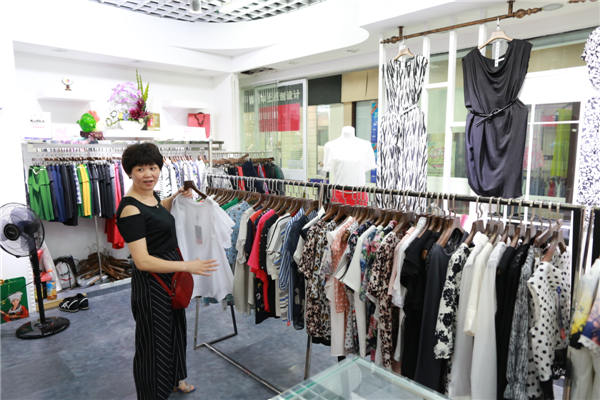Merchants of Yiwu
By Satarupa Bhattacharjya In Yiwu, Zhejiang Province ( China Daily ) Updated: 2015-09-05 08:03:22
 |
|
A customer picking clothes in Korea City, a retail section in the Haungyuan wholesale clothes market of Yiwu. Feng Yongbin / China Daily |
How foreign traders live life in the heart of 'made in China'
On a weekday night downtown, a young woman in a pink off-shoulder dress emerges from the opening in a car roof, jiving to music. The dark convertible, with her male companion at the wheel, zips through the street as traffic lights change. From a distance, her wind-blown hair and bobbing thin frame make her look like a character from a video game.
The scene unfolds in Yiwu, a nondescript county-level city in East China's Zhejiang province, far removed from any world capital of fashion or entertainment. But it is from here that merchants from about 220 countries, including war-torn Syria, buy their daily necessities.
From toothbrushes to scarves this is the epicenter of "made in China".
And it is not just locals who seem to be living it up in this small city that has more than a few fast cars. Recent interviews with dozens of foreign and Chinese traders, logistics companies, goods vendors and local government officials in Yiwu, suggest the same applies to the city's expatriate community.
It is home to nearly 15,000 foreign traders, most of whom are Arabs. Yiwu's indigenous population is about 1.23 million, according to China's latest census, in 2010.
The city has more than 100 Arabic and Korean restaurants; at least one Italian restaurant; a handful of Arabic, Indian and Korean schools; more than 30 mosques, a church, a Hindu and a separate Sikh temple. Cricket, a rare sport in China is occasionally played here, even drawing participants from among the local Chinese.
Over the past decade or so, Yiwu has slowly transformed, the first batch of foreign settlers having arrived in the early 2000s.
"Foreigners found it difficult to open bank accounts, set up shop or find places to eat," says Ahmed Tirkawy, a Sudanese businessman, of his initial days in Yiwu 12 years ago.
The 39-year-old manager of Blue Moon Trading Co Ltd has since not only successfully exported Chinese garments to his home country, Palestine and Dubai, but has also watched the city of "two or three buildings" grow into an air-conditioned wholesale establishment sprawling across millions of square meters.
For him, not finding halal eateries has become a thing of the past, he says.
A cluster of farming villages next to an outdoor market defined Yiwu in the 1970s. But today, it is considered the global center of small commodities, receiving more than 400,000 business visitors each year. Zhejiang's economy as a top national performer has helped raise the city's profile.
With the Zhao Yu hills as a backdrop, Yiwu is close to the busy ports of Ningbo and Shanghai, making the shipment of goods easy. It is in Jinhua prefecture, which borders Hangzhou, the provincial capital and a manufacturing base.
More than 95 percent of the foreign traders in export-driven Yiwu buy goods of various types numbering in the hundreds of thousands and resell them in Africa, the Middle East, other markets in Asia and the West. Yiwu made $15.4 billion from exports in the first half of the year, says Wang Birong, the director general of its Bureau of Commerce.
|
|
|
|
|
|
|
|

























 Raymond Zhou:
Raymond Zhou: Pauline D Loh:
Pauline D Loh: Hot Pot
Hot Pot Eco China
Eco China China Dream
China Dream China Face
China Face






